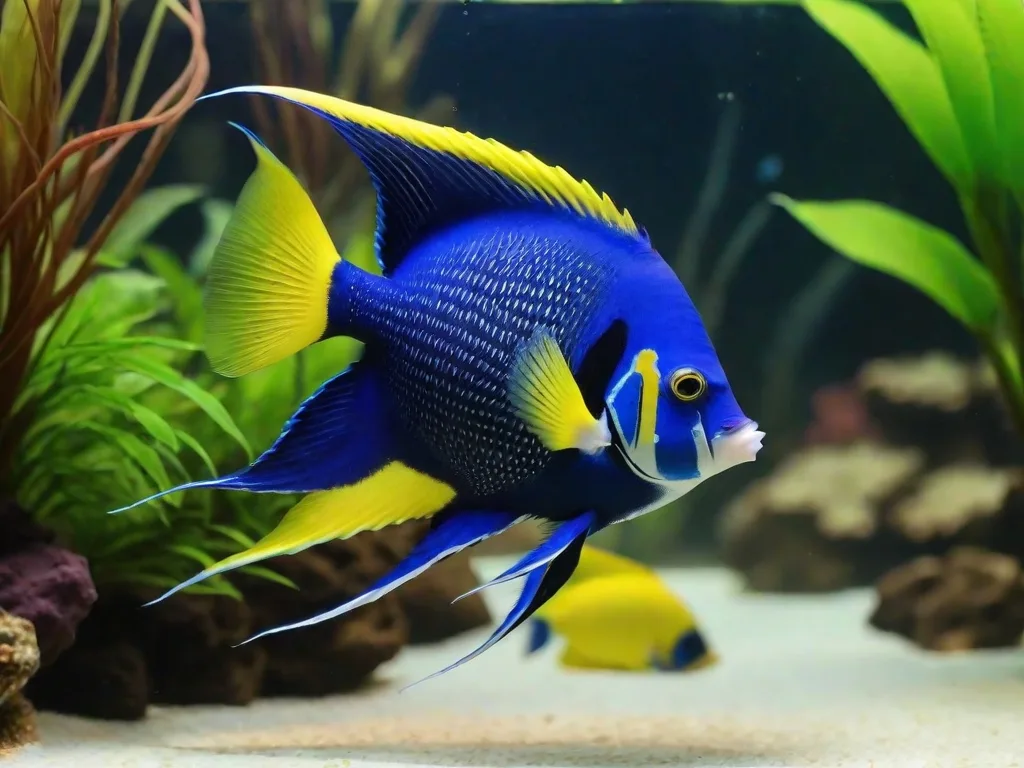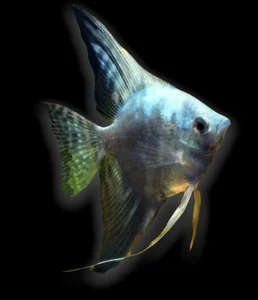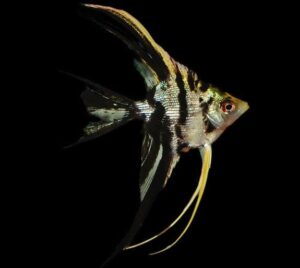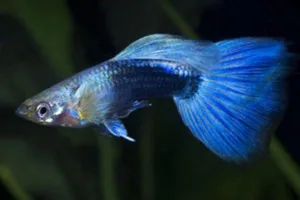Angelfish hex disease, also known as Hexamita, is a parasitic infection that commonly affects angelfish and other freshwater fish. It is caused by a microscopic organism called Hexamita, which can impact the digestive system of the fish. The symptoms of angelfish hex disease include lethargy, weight loss, bloating, and a stringy white feces.
To address this issue, it’s crucial to isolate the infected fish to prevent the spread of the disease. Treatment often involves using anti-parasitic medications specifically designed to combat Hexamita. Additionally, maintaining a clean and well-filtered aquarium, along with providing a balanced diet, can contribute to preventing the occurrence of hex disease.
Regular observation of your fish, prompt quarantine of any showing symptoms, and consulting with a knowledgeable aquarium professional or veterinarian can be helpful in managing and preventing diseases in your aquarium.
Symptoms
Angelfish hex disease, caused by the parasite Hexamita, can exhibit several symptoms in infected fish. It’s essential to monitor your angelfish closely for signs of illness. Common symptoms of angelfish hex disease include:
- Lethargy: Infected fish may appear lethargic and less active than usual.
- Weight Loss: Hexamita can affect the digestive system, leading to weight loss in infected fish.
- Bloating: The presence of the parasite can cause bloating in the abdomen of the fish.
- Stringy White Feces: An observable change in the feces of the fish, often appearing stringy and white, is a common sign of hexamita infection.
- Decreased Appetite: Infected fish may show a reduced interest in eating, contributing to weight loss.
- Darkened Coloration: Some fish may exhibit a change in color, appearing darker or more subdued.
- Hovering Near the Surface: Fish infected with Hexamita may display abnormal behavior, such as hovering near the water’s surface.
If you notice any of these symptoms in your angelfish, it’s crucial to take prompt action. Isolate the affected fish to prevent the potential spread of the disease to others in the aquarium. Consult with a knowledgeable aquarium professional or a veterinarian experienced in fish health to determine an appropriate treatment plan, which often involves using anti-parasitic medications.
Regular monitoring of your aquarium, maintaining good water quality, and providing a balanced diet are essential practices to prevent the occurrence of diseases, including hex disease, in your fish.
Treatment Hexamita
The treatment of angelfish hex disease involves addressing the underlying parasitic infection caused by Hexamita. Here are steps you can take to treat affected fish:
- Isolation: Immediately isolate the infected angelfish to prevent the spread of the disease to other tank inhabitants.
- Medication: Use a suitable anti-parasitic medication designed to combat Hexamita. Metronidazole is a commonly recommended medication for treating this type of parasitic infection. Follow the dosage instructions provided with the medication or as advised by a fish health professional.
- Quarantine: Keep the infected fish in a quarantine tank for the duration of the treatment. This helps ensure that the medication is effectively targeting the parasite without affecting the main aquarium’s ecosystem.
- Water Quality: Maintain excellent water quality in both the main aquarium and the quarantine tank. Regular water changes, proper filtration, and monitoring ammonia and nitrite levels are essential during treatment.
- Temperature Control: Some medications may be more effective when used in conjunction with an increase in water temperature. However, make sure not to stress the fish by raising the temperature too quickly or to extreme levels.
- Observation: Monitor the fish closely throughout the treatment process. Look for signs of improvement, such as increased activity, a return to normal feeding behavior, and a reduction in symptoms.
It’s crucial to follow the specific recommendations provided with the chosen medication and consult with a fish health professional if needed. Prevention is also key, so continue to maintain a clean and well-balanced aquarium environment to reduce the risk of future infections.
Always consult with an experienced aquarium professional or veterinarian for accurate diagnosis and guidance tailored to your specific situation.
Prevention
Preventing angelfish hex disease and other health issues in your aquarium involves maintaining good overall fish care and hygiene practices. Here are some preventive measures:
- Quarantine New Fish: Before introducing new fish to your main aquarium, quarantine them in a separate tank for a few weeks. This helps identify and address any potential health issues before they can spread to your existing fish.
- Clean Water: Regularly monitor and maintain excellent water quality. Perform routine water changes to remove accumulated waste and maintain appropriate levels of ammonia, nitrite, and nitrate.
- Balanced Diet: Provide a balanced and nutritionally complete diet for your angelfish. A healthy diet helps boost their immune system and resilience against diseases.
- Avoid Overcrowding: Overcrowded conditions can stress fish and contribute to the spread of diseases. Ensure that your aquarium is appropriately sized for the number and size of fish you have.
- Quarantine Sick Fish: If you notice any signs of illness in a fish, promptly isolate it in a quarantine tank. This helps prevent the spread of disease to other tank inhabitants and allows for targeted treatment.
- Routine Observation: Regularly observe your fish for any changes in behavior, appearance, or eating habits. Early detection of issues allows for prompt intervention and treatment.
- Maintain Stable Conditions: Avoid sudden changes in water temperature, pH, or other environmental factors. Fish thrive in stable conditions, and fluctuations can stress them, making them more susceptible to diseases.
- Use of Medications: Periodically use preventive medications or treatments as recommended by experienced aquarium professionals. These may include anti-parasitic or antibacterial medications to ward off potential infections.
By incorporating these practices into your aquarium maintenance routine, you can significantly reduce the risk of angelfish hex disease and other health issues. Regular attention to your fish’s well-being contributes to a healthier and more enjoyable aquarium environment.
Angelfish hex disease is primarily caused by a parasitic infection involving a microscopic organism called Hexamita. Hexamita is a flagellate protozoan parasite that commonly affects freshwater fish, including angelfish. The exact causes of the infection can vary, but several factors may contribute to the development of angelfish hex disease:
Angelfish Hex Disease Causes
- Poor Water Quality: High levels of ammonia, nitrites, or nitrates in the aquarium can stress fish and compromise their immune systems, making them more susceptible to infections, including those caused by Hexamita.
- Stress: Stress is a significant factor in fish health. Angelfish that are stressed due to overcrowding, sudden environmental changes, or aggressive tank mates may be more prone to infections.
- Contaminated Food: Hexamita can be present in contaminated live or frozen foods. Feeding your angelfish with high-quality, properly stored, and appropriately treated food can help minimize this risk.
- Introduction of Infected Fish: Bringing new fish into the aquarium without proper quarantine measures can introduce parasites, including Hexamita, to the established population.
- Temperature Fluctuations: Rapid or extreme changes in water temperature can stress fish and weaken their immune systems, making them more susceptible to infections.
Preventing angelfish hex disease involves addressing these potential causes. Maintaining optimal water quality, providing a balanced diet, avoiding overcrowding, and quarantining new fish are key practices to minimize the risk of Hexamita infections and other health issues in your angelfish. Regular observation and prompt action in case of any signs of illness are essential components of effective disease prevention.
other angelfish articles
- Angelfish Fin Rot | Symptoms, Treatment and Prevention
- Angelfish in the Wild: A Closer Look at These Amazonian Wonders
- Angelfish Myths Unveiled: Separating Fact from Fiction
- Mastering Angelfish Care for Advanced Hobbyists
- Angelfish for Beginners Guide
- Exploring the World of Angelfish and Invertebrates
- Angelfish and Cichlids Compatibility: Finding Harmony in Your Aquarium
- Creating a Stunning Angelfish Planted Tank: A Comprehensive Guide
Angelfish Hex Disease In Humans
Angelfish hex disease is a term used specifically in the context of a parasitic infection affecting angelfish and other freshwater fish. There is no direct correlation or risk of this disease affecting humans. The parasite responsible for angelfish hex disease, Hexamita, is specific to fish and does not pose a threat to human health.
It’s essential to note that diseases affecting animals, including fish, are typically caused by specific pathogens that are adapted to their hosts. Therefore, the transmission of diseases from fish to humans, known as zoonoses, is quite rare and usually involves different types of pathogens than those affecting fish.
However, it’s always crucial to practice good hygiene when handling aquarium water or equipment to prevent potential exposure to harmful bacteria or parasites. Wash your hands thoroughly after working in or around the aquarium, and avoid contact with aquarium water if you have open cuts or sores on your hands.
In summary, angelfish hex disease is not a concern for human health, but practicing good hygiene when maintaining an aquarium is a general precaution to reduce any potential risk.
Disclaimer
The information provided here is for general guidance and educational purposes only. It is not intended as a substitute for professional veterinary or aquarium advice. Fish health can be complex, and individual cases may vary. If you suspect that your fish may be ill or if you have specific concerns about their health, it is recommended to consult with a qualified aquarium professional or a veterinarian experienced in fish health.
Any actions taken based on the information provided are at the user’s discretion and risk. The user is responsible for ensuring the well-being of their fish and should seek professional advice when needed. Additionally, be aware that advancements in research and changes in best practices may occur over time, so staying informed and consulting with experts is essential for responsible fishkeeping.
Remember to follow appropriate safety measures when handling aquarium equipment, water, or any substances used in fish care. Wash your hands thoroughly after any contact with aquarium-related items.
Ultimately, the health and well-being of your fish are of utmost importance, and professional guidance should be sought for specific concerns or conditions.











